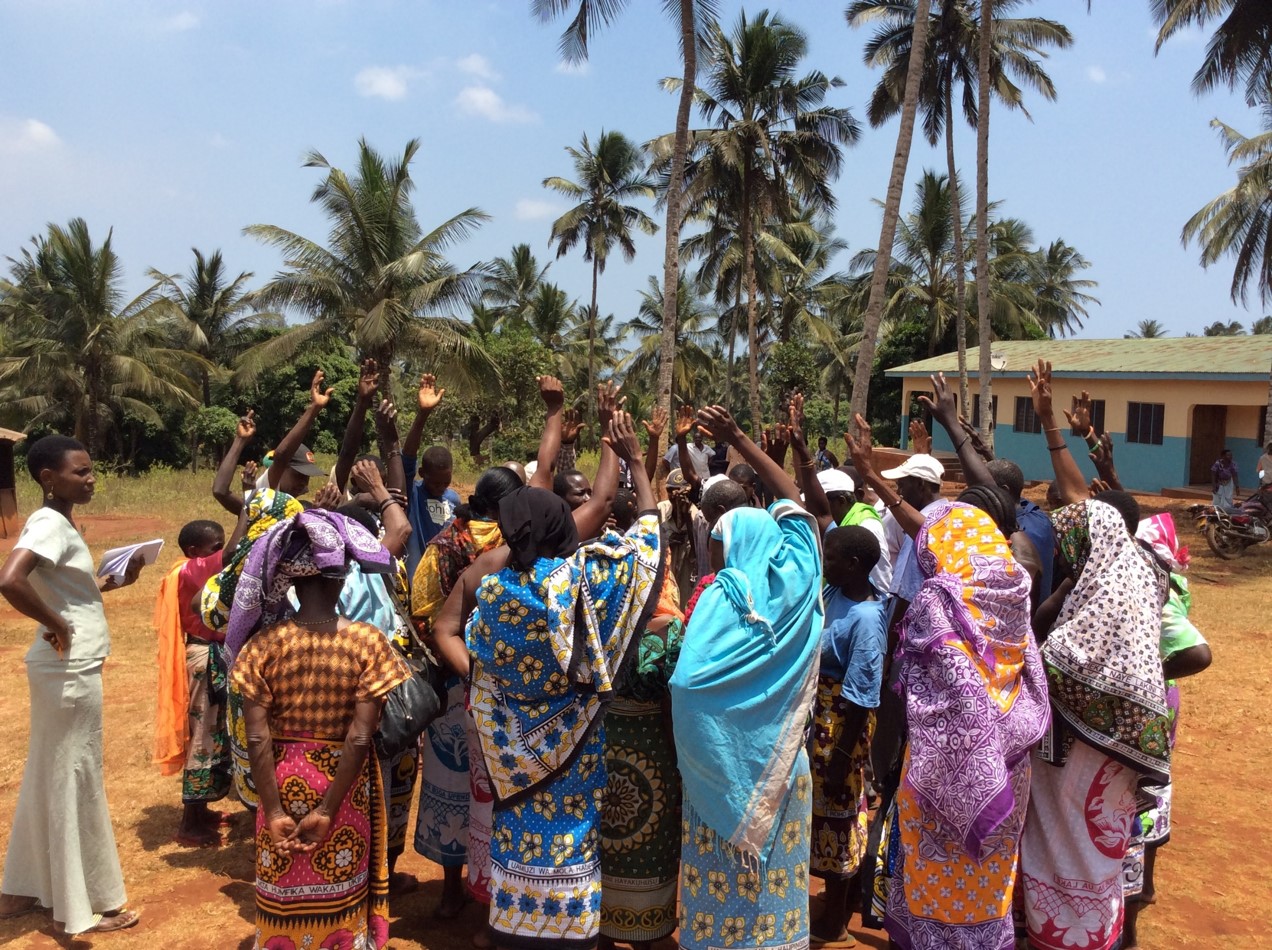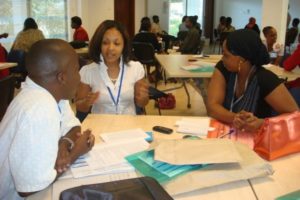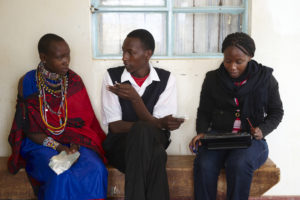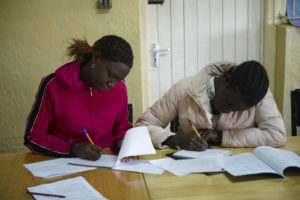Building relationships
The overall aim of health systems research is applied; to make a positive difference to policy and practice. This requires mutual understanding throughout the research process between researchers and implementers (governments, NGOs, and communities).
Strong respectful relationships – between investigators, between researchers and the communities and institutions that they work in, with policy makers, practitioners and other users of research – are key to research success and vital to ethical practice. In this section we have collected resources which illuminate how relationships can prompt ethical quandaries but also support identifying strategies to resolve them.
Some research projects are undertaken within collaborations or consortia which bring together implementing organisations from a number of countries or organisations. Parker and Kingori’s (2016) paper highlights for collaborative global health the importance of a series of factors that researchers see as essential in judging the merits of active participation in global health collaborations, including: respect for the needs, interests and agendas of partners; opportunities for discussion and disagreement; trust and confidence; and, justice and fairness in collaboration. This and other papers highlight that collaborations and consortia are shaped by a range of power dynamics and imbalances which researchers should be mindful of. Pratt and Hyder (2016) provide a checklist that can be used by trans-national research collaborations to determine where their governance practices strongly promote equity and where they may fall short.
The paper by Crane et al. (2017) addresses the issue of capacity building (which many donors demand as a component of research partnerships). Often the flow of resources, skills and knowledge is assumed to flow from high-income countries to low- and middle-income countries within these frameworks. The paper explores how one capacity development intervention led to new risks and the weakening of local ownership and room for manoeuvre. It offers lessons for how these negative outcomes can be avoided.
The paper by Hyder et al. (2012) outline some of the ethical issues that come to the fore when researchers engage with low-resource communities over the longer term. These include: “fair benefits and long-term beneficence; community autonomy, consultation and consent; impacts on local health systems; economic impacts of research participation; ethical review processes; and institutional processes and oversight within research organizations.”
We have also included literature on ‘community engagement’ which is a package of interventions employed by research programmes to ensure that local views and beliefs are taken into account and ideally shape priorities and practice. These cover issues like consent, agenda setting and equity.
Useful resources
A systematic review on ethical challenges of ‘field’ research in low-income and middle-income countries: respect, justice and beneficence for research staff?
Primary data collection in low-income and middle-income countries (LMICs) is associated with a range of ethical complexities. Considerations on how to adequately ensure the well-being of research staff are largely neglected in contemporary ethics discourse. This systematic review aims to identify the ethical challenges that research staff across different hierarchical levels and scientific disciplines face […]

Working with Community Advisory Boards/Groups to support community engagement in clinical research on COVID-19
Community Advisory Boards and Groups COVID 19 There is wide agreement that community engagement (CE) is important to strengthen collaborativepartnerships and ethical practice across many research types and settings, often including interaction with ‘representatives’ of communities. Community Advisory Boards/Groups (CAB/Gs), or variants of these, are the most widely documented structures supporting CE. Here we share […]
Equity, challenge studies and community engagement in bioethics?
Community engagement is gaining prominence in global health research. Growing consensus about the importance of community representation and participation for ethical research means research institutions and funding bodies now promote, or even mandate, engagement with communities as an important component of “traditional” non-participatory health research projects. In practice, however, global health research priority-setting is dominated […]
How can we do a better job of setting research agendas with communities?
Community engagement is gaining prominence in global health research. Growing consensus about the importance of community representation and participation for ethical research means research institutions and funding bodies now promote, or even mandate, engagement with communities as an important component of “traditional” non-participatory health research projects. In practice, however, global health research priority-setting is dominated […]
Vulnerability in research ethics: a way forward
Several foundational documents of bioethics mention the special obligation researchers have to vulnerable research participants. However, the treatment of vulnerability offered by these documents often relies on enumeration of vulnerable groups rather than an analysis of the features that make such groups vulnerable. Recent attempts in the scholarly literature to lend philosophical weight to the […]
Good and Bad Research Collaborations: Researchers’ Views on Science and Ethics in Global Health Research
There has been a dramatic rise in the scale and scope of collaborative global health research. A number of structural and scientific factors explain this growth and there has been much discussion of these in the literature. Little, if any, attention has been paid, however, to the factors identified by scientists and other research actors […]
Governance of Transnational Global Health Research Consortia and Health Equity
Global health research partnerships are increasingly taking the form of consortia of institutions from high-income countries and low- and middle-income countries that undertake programs of research. These partnerships differ from collaborations that carry out single projects in the multiplicity of their goals, scope of their activities, and nature of their management. Although such consortia typically […]
Why bioethics needs a concept of vulnerability
Concern for human vulnerability seems to be at the heart of bioethical inquiry, but the concept of vulnerability is under-theorized in the bioethical literature. The aim of this article is to show why bioethics needs an adequately theorized and nuanced conception of vulnerability. We first review approaches to vulnerability in research ethics and public health […]
Ethical dilemmas of social science research on AIDS and orphanhood in Western Kenya
This paper is based on the experiences drawn from a long-term social science research programme on the impact of the AIDS pandemic on orphanhood in western Kenya. It discusses the ethical dilemma of maintaining a delicate balance between research ethics, the expectations of the study population and negotiating the community’s vested interests in a health-related research project […]
The ‘indirect costs’ of underfunding foreign partners in global health research: A case study
This study of a global health research partnership assesses how U.S. fiscal administrative policies impact capacity building at foreign partner institutions. We conducted a case study of a research collaboration between Mbarara University of Science and Technology (MUST) in Mbarara, Uganda, and originally the University of California San Francisco (UCSF), but now Massachusetts General Hospital […]
Public/community engagement in health research with men who have sex with men in sub-Saharan Africa: challenges and opportunities
Community engagement, incorporating elements of the broader concepts of public and stakeholder engagement, is increasingly promoted globally, including for health research conducted in developing countries. In sub-Saharan Africa, community engagement needs and challenges are arguably intensified for studies involving gay, bisexual and other men who have sex with men, where male same-sex sexual interactions are […]
Exploring the Ethics of Long-Term Research Engagement With Communities in Low- and Middle-Income Countries
Over the past few decades, there has been increasing attention focused on the ethics of health research, particularly in low- and middle-income countries. Despite the increasing focus on the literature addressing human protection, community engagement, appropriate consent procedures and ways to mitigate concerns around exploitation, there has been little discussion about how the duration of […]
Gendered negotiations for research participation in community-based studies: implications for health research policy and practice
There is a growing literature documenting the complex realities of consent processes in the field, and the negotiations and ethical dilemmas involved. Much has also been written about how gender and power shape household decision-making processes. However, these bodies of literature have rarely been brought together to inform research theory and practice in low-income settings. […]
“When they see us, it’s like they have seen the benefits!” experiences of study benefits negotiations in community-based studies on the Kenyan Coast
Benefit sharing in health research has been the focus of international debates for many years, particularly in developing countries. Whilst increasing attention is being given to frameworks that can guide researchers to determine levels of benefits to participants, there is little empirical research from developing countries on the practical application of these frameworks, including in […]
Morals, morale and motivations in data fabrication: Medical research fieldworkers views and practices in two Sub-Saharan African contexts
Data fabrication, incorrect collection strategies and poor data management, are considered detrimental to high-quality scientific research. While poor data management have been occasionally excused, fabrication constitutes a cardinal sin and scientific misconduct. Scholarly examinations of fabrication usually seek to expose and capture its prevalence and, less frequently, its consequences and causes. Most accounts centre on […]
To research (or not) that is the question: ethical issues in research when medical care is disrupted by political action: a case study from Eldoret, Kenya
While considerable attention has been focused on understanding the myriad of ethical analysis in international research in low- and middle-income countries, new issues always arise that have not been anticipated in guidelines or studied extensively. The disruption of medical care arising as a direct result of political actions, including strikes, post-election violence and related activities, […]
Unethical ethics? Reflections on intercultural research practices
The notion that there is a universal ethics is commonly supposed, but less often explicitly discussed, in protocols for ethical procedures in research. In this article, the authors reflect on their action-research with women farmers in a Bolivian highland province. Their project aims to propose ways in which local health services could better serve these […]
Editorial: Ethics and ethnography in medical research in Africa. Social Science & Medicine
By summarising papers delivered at a conference in Kilifi, Kenya this article provides useful learning on relationships in the health research process. The authors argue that more should be done to understand the ethics of relationships between “whole populations, the functioning of research institutions, the processes of collaboration, and the ethics of inequitable international relations.” […]
Private talk: Testimony, evidence, and the practice of anonymization in research
Anonymity is accepted as necessary for the generation of empirical knowledge concerning human research participants, especially for members of “vulnerable” groups. In particular, anonymity has been given a role in easing the challenges of giving voice to experiences that disrupt familiar and convenient paradigms of knowledge. This paper troubles such a notion, on the grounds […]
Ethics and the ethnography of medical research in Africa
The ethics of medical research have grown as an area of expertise and debate in recent years, with two broad approaches emerging in relation to transnational research: (1) the refinement of guidelines and strengthening of review, processes primarily to protect the right of individual research participants and strengthen interpersonal relations at the micro-level; and (2) […]
Global health research in an unequal world: ethics case studies from Africa
This book is a collection of fictionalised case studies of everyday ethical dilemmas and challenges, encountered in the process of conducting global health research in places where the effects of global, political and economic inequality are particularly evident. It is a training tool to fill the gap between research ethics guidelines and their implementation on […]
Experiencing everyday ethics in context: Frontline data collectors perspectives and practices of bioethics
Data collectors play a vital role in producing scientific knowledge. They are also an important component in understanding the practice of bioethics. Yet, very little attention has been given to their everyday experiences or the context in which they are expected to undertake these tasks. This paper argues that while there has been extensive philosophical […]
Patient engagement in research: a systematic Review
A compelling ethical rationale supports patient engagement in healthcare research. It is also assumed that patient engagement will lead to research findings that are more pertinent to patients’ concerns and dilemmas. However; it is unclear how to best conduct this process. In this systematic review we aimed to answer four key questions: what are the […]
Defining Health Research for Development: The perspective of stakeholders from an international health research partnership in Ghana and Tanzania
The study uses a qualitative empirical method to define Health Research for Development. This project explores the perspectives of stakeholders in an international health research partnership operating in Ghana and Tanzania. We conducted 52 key informant interviews with major stakeholders in an international multicenter partnership between GlaxoSmithKline (GSK, Vaccine Developer) and the global health nonprofit […]
“The way the country has been carved up by researchers”: ethics and power in north–south public health research
Despite the recognition of power as being central to health research collaborations between high-income countries and low- and middle-income countries, there has been insufficient detailed analysis of power within these partnerships. The politics of research in the global south is often considered outside of the remit of research ethics. This article reports on an analysis […]
Research Involving Health Providers and Managers: Ethical Issues Faced by Researchers Conducting Diverse Health Policy and Systems Research in Kenya,
There is a growing interest in the ethics of Health Policy and Systems Research (HPSR), and especially in areas that have particular ethical salience across HPSR. Hyder et al (2014) provide an initial framework to consider this, and call for more conceptual and empirical work. In this paper, we respond by examining the ethical issues that […]
Involving Research Stakeholders in Developing Policy on Sharing Public Health Research Data in Kenya Views on Fair Process for Informed Consent, Access Oversight, and Community Engagement
Increased global sharing of public health research data has potential to advance scientific progress but may present challenges to the interests of research stakeholders, particularly in low-to-middle income countries. Policies for data sharing should be responsive to public views, but there is little evidence of the systematic study of these from low-income countries. This qualitative […]
Consent and community engagement in diverse research contexts
Consent and community engagement (CE) in health research are two aspects of a single concern-that research is carried out in a respectful manner where social value is maximized. There are important overlaps and interdependencies between consent and CE; for example, CE can provide insights into how best to tailor consent to context and can be […]
Field workers at the interface
This issue of Developing World Bioethics includes a collection of papers on intermediary staff and volunteers working at the interface between research institutions and researchers, and the communities from which research participants are recruited. ‘Field worker’ – a short hand commonly used in many research settings – refers here to those whose main role is […]




